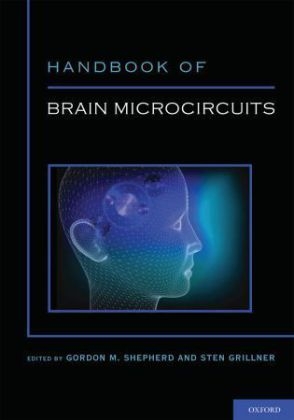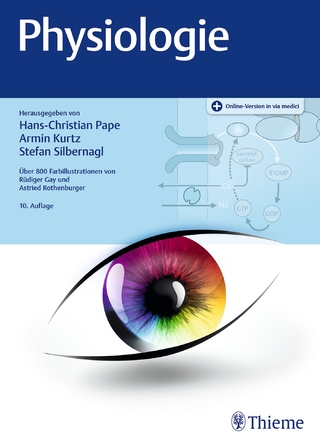
Handbook of Brain Microcircuits
Oxford University Press (Verlag)
978-0-19-538988-3 (ISBN)
- Titel ist leider vergriffen;
keine Neuauflage - Artikel merken
Oxford Clinical Neuroscience is a comprehensive, cross-searchable collection of resources offering quick and easy access to eleven of Oxford University Press's prestigious neuroscience texts. Joining Oxford Medicine Online these resources offer students, specialists and clinical researchers the best quality content in an easy-to-access format.
Professor Shepherd was educated at Iowa State College and Harvard Medical School during the 1950s, and received further training at Oxford University, the National Institutes of Health, and Karolinska Institutet. He has been at the Yale University School of Medicine since 1967, and has held visiting positions at the University of Pennsylvania, Collège de France, Ècole Normale Supérieure, Oxford University, and Institut Pasteur. In his research he and his collaborators introduced computational modeling into studies of brain neurons, revealed a new type of neuronal interaction between dendrites, and showed how smells are represented in the brain by distinct patterns of activity. His work has led to new concepts of brain organization, including the term microcircuits to describe canonical types of neuronal interactions. He has been editor in chief of the Journal of Neurophysiology and the Journal of Neuroscience. His books include The Synaptic Organization of the Brain, Neurobiology, and Creating Modern Neuroscience: The Revolutionary 1950s. His Foundations of the Neuron Doctrine was the first to focus on the dramatic events around the classical work on the neuron in the 19th and early 20th century. The present work takes up the even more dramatic events around the work at mid-20th century that established the modern neuroscience of today. Professor Grillner was educated at the University of Göteborg in Sweden. He is past Chairman if the Nobel Assemply at the Karolinska Institutet. Currently he is Director of the Nobel Institute for Neurophysiology at the Karolinska Institutet in Stockholm.
Introduction
Gordon M. Shepherd and Sten Grillner
Contributors
Part 1: Vertebrates
Section 1: Neocortex
Chapter 1: Neocortical Microcircuits
Javier DeFelipe and Edward G. Jones
Chapter 2: Canonical Cortical Circuits
Rodney J. Douglas and Kevan A.C. Martin
Chapter 3: Microcircuitry of the Neocortex
Henry Markram
Chapter 4: Barrel Cortex
Karel Svoboda, Bryan M. Hooks, and Gordon M.G. Shepherd
Chapter 5: The Motor Cortical Circuit (MCC)
Apostolos P. Georgopoulos and Costas N. Stefanis
Chapter 6: Prefrontal Cortex
Xiao-Jing Wang
Section 2: Thalamus
Chapter 7: Thalamus
Edward G. Jones
Chapter 8: The Lateral Geniculate Nucleus
S. Murray Sherman
Chapter 9: Thalamocortical Networks
David A. McCormick
Section 3: Circadian System
Chapter 10: The Suprachiasmatic Nucleus
Gabriella B. Lundkvist and Gene Block
Section 4: Basal Ganglia
Chapter 11: Microcircuits of the Striatum.
J. Paul Bolam
Chapter 12: Templates for Neural Dynamics in the Striatum: Striosomes and Matrisomes
Ann M. Graybiel
Chapter 13: Subthalamo-Pallidal Circuit
Charles J. Wilson
Section 5: Limbic Systems
Chapter 14: Amygdala complex
Luke R. Johnson and Joseph E. Ledoux
Chapter 15: Hippocampus- Intrinsic Organization
Peter Somogyi
Chapter 16: Hippocampus: physiology
György Buzsáki
Chapter 17: Entorhinal cortex
Edvard I. Moser, Menno P. Witter, and May-Britt Moser
Section 6: Visual System
Chapter 18: Retina: Microcircuits for Daylight, Twilight, and Starlight
Jonathan B. Demb
Chapter 19: Evolution of Retinal Circuitry: From Then to Now
Frank S. Werblin and John Dowling
Section 7: Auditory System
Chapter 20: Cochlea
Peter Dallos
Chapter 21: Cochlear Nucleus
Eric D. Young and Donata Oertel
Chapter 22: Nucleus Laminaris
Yuan Wang, Jason Tait Sanchez, and Edwin W. Rubel
Section 8: Touch System
Chapter 23: Spinal cord: dorsal horn
Frédéric Nagy
Section 9: Olfactory System
Chapter 24: Olfactory Bulb
Gordon M. Shepherd, Michele Migliore, and David C. Willhite
Chapter 25: Olfactory cortex
Donald A. Wilson and Edi Barkai
Section 10: Taste System
Chapter 26: Taste Coding and Feed-forward/ Feedback Signaling in Taste Buds
Stephen D. Roper and Nirupa Chaudhari
Chapter 27: Microcircuitry of the Rostral Nucleus of the Solitary Tract
Joseph B. Travers and Susan P. Travers
Section 11: Cerebellum
Chapter 28: Cerebellar cortex
Masao Ito
Chapter 29: Olivo-Cerebellar System
Rodolfo R. Llinás
Section 12: Motor Systems
Chapter 30: Superior colliculus
Katsuyuki Kaneda and Tadashi Isa
Chapter 31: The Mammalian Brainstem Chewing Circuitry
Arlette Kolta and James P. Lund
Chapter 32: Lamprey Swimming Circuit
Sten Grillner
Chapter 33: The Mauthner Cell: Sensory Integration, Decision-making, and Motor Functions
Donald S. Faber and Henri Korn
Chapter 34: Modulation of Lamprey Locomotor Circuit
A. El Manira
Chapter 35: Tadpole Swimming Network
Keith T. Sillar and Wenchang Li
Chapter 36: Spinal circuit for escape in goldfish and zebrafish
Joseph R. Fetcho
Chapter 37: Locomotor circuits in the developing rodent spinal cord
Ole Kiehn and Kimberly J. Dougherty
Chapter 38: The Lamprey Postural Circuit
Tatiana G. Deliagina, Pavel V. Zelenin, and Grigori N. Orlovsky
Chapter 39: Respiratory CPG
Jack L. Feldman
Part 2: Invertebrates
Section 1: Visual System
Chapter 40: Neurons and circuits contributing to the detection of directional motion across the fly's retina.
Nicholas J. Strausfeld
Chapter 41: The optic lamina of fast flying insects as a guide to neural circuit design
Simon B. Laughlin
Section 2: Olfactory System
Chapter 42: Implications from Microcircuits of a Moth Antennal Lobe for Olfactory Information
Processing
Hong Lei, Lynne A. Oland, Jeffrey A. Riffell, Aaron Beyerlein, and John G. Hildebrand
Chapter 43: Antennal Lobe of the Honeybee
Randolf Menzel and Jürgen Rybak
Chapter 44: Mushroom Body of the Honeybee
Jürgen Rybak and Randolf Menzel
Section 3: Motor Systems
Chapter 45: The Tritonia Swim Central Pattern Generator
Paul S. Katz
Chapter 46: The heartbeat neural control system of the leech
Ronald L. Calabrese
Chapter 47: The Leech Local Bending Circuit
William B. Kristan, Jr.
Chapter 48: Neural circuits that generate swimming movements in leeches
Wolfgang Otto Friesen
Chapter 49: Stomatogastric CPG
Eve Marder
Chapter 50: The swimming circuit in the Pteropod Mollusc Clione limacina
Yuri I. Arshavsky, Tatiana G. Deliagina, and Grigori N. Orlovsky
Chapter 51: The circuit of chemotaxis and exploratory behavior in C. elegans
Cornelia I. Bargmann
Chapter 52: The Neuronal Circuit for Simple Forms of Learning in Aplysia
Robert D. Hawkins, Craig H. Bailey and Eric R. Kandel
Index
| Verlagsort | Oxford |
|---|---|
| Sprache | englisch |
| Maße | 184 x 258 mm |
| Gewicht | 1492 g |
| Themenwelt | Medizin / Pharmazie ► Medizinische Fachgebiete ► Neurologie |
| Studium ► 1. Studienabschnitt (Vorklinik) ► Physiologie | |
| Schlagworte | Gehirn • Neurowissenschaft |
| ISBN-10 | 0-19-538988-3 / 0195389883 |
| ISBN-13 | 978-0-19-538988-3 / 9780195389883 |
| Zustand | Neuware |
| Haben Sie eine Frage zum Produkt? |
aus dem Bereich


